China Stock Market: Shares Might Sink, But Cooler Heads See Nothing Justifying The Global Panic

There are a lot of great reasons not to get wound up about financial market turbulence emanating from China in the past few weeks. A lot of smart people are making the case for cooler heads these days, calling the global markets slump triggered by concerns over the Chinese economy exaggerated.
It’s fair enough to state the facts: Equity markets around the world have gotten off to an exceptionally bad start in 2016. The 9 percent decline in the Standard & Poor's 500 is the second-worst start to a calendar year since 1929, according to Goldman Sachs, the worst being the 11 percent decline in 2009, when the pall of the financial crisis was settling over the global economy.
It’s also fair to look more closely at the stock market in China that spurred repeated routs as the sun rose in Europe and the United States. Since 1994, the Shanghai Composite Index has experience 32 bear markets, defined as a drop of 20 percent or more. Just last month it was one of the best-performing indices in the world.
“China’s domestic stock market, which has always been extremely volatile, has never been highly correlated to the broader economy,” Andy Rothman, an investment strategist with Matthews Asia, wrote in a research note.
Put another way: If we can say that the main culprit in plunging markets tends to behave irrationally, and that behavior tells us very little about the state of the world’s second-largest economy, then what, exactly, are we worried about? Jamie Dimon, the CEO of JPMorgan Chase, exhorts the world to have confidence in a more reasoned judgment.
“When the market is this bad, it’s reasonable to say it might be telling you something, but it’s also reasonable to say maybe it’s not,” Dimon told CNBC while attending the annual World Economic Forum in Davos, Switzerland, this week.
The most that can be said, according to Elan Pashtan, an economist with Goldman Sachs, is if shares continue to decline, there’s a slightly greater risk the global economic growth isn’t, or won’t be, what investors might have hoped for. The global sell-off in equities isn’t a leading indicator of massive trouble, like it was in 2008, or a consequence of similar economic issues, as it was in 2009.
“Current weakness in the equity market overstates the headwinds facing the real economy — although any further equity market weakness incrementally increases the odds that economic growth may be slowing,” Pashtan wrote in a research note.
Chris Rupkey, chief financial economist at Bank of Tokyo-Mitsubishi UFJ in New York City, said there is a simple reason for dropping share prices: panic. The good news is that eventually investors will come to their senses.
"The sell-off is simply happening too fast, which signals panic selling more than reasoned investment decisions based on fundamentals like the economy and corporate earnings are driving these losses,” Rupkey said in a research paper. “It can't last. We've never seen the stock market out so far in front of the economic fundamentals.”
What’s more, even the weakness in the real economy in China might not be what it seems, Rothman noted. Sure, China “only” grew by 6.9 percent in the final quarter of 2015. But that growth was based on an economy that is three times the size it was a decade ago when growth exceeded 10 percent.
“Last year’s slower growth rate actually provided a larger opportunity for firms selling goods and services in China as well as a better opportunity for us to invest in those firms” than when the Chinese economy grew at a blazing pace, Rothman wrote. Now the Chinese economy is three times larger, so 6.9 percent growth now is worth much more than 10 percent growth back then.
Stephen Schwarzman, CEO of private equity giant Blackstone, pointed out from Davos that China’s transition to a more services-based economy does have the upside that it’s bound to be a more stable economy.
The signs point to this development being in full swing. Real income — wages less inflation — rose 7.4 percent in 2015, after an 8 percent increase in 2014. Major corporations are heavily indebted, but households, with their substantial savings, are not.
"The parts of the economy that are doing pretty well are quite good, and if China can settle down over time to grow at 5 percent long term in the services economy, that would be a good thing," Schwarzman said.
© Copyright IBTimes 2024. All rights reserved.




















